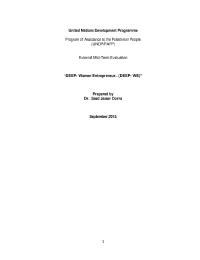
Mid Term Evaluation- DEEP- Women Entrepreneur (DEEP- WE)
Completedon 9 Sep, 2015
Evaluation Plan
Planned End Date
Jul 2015
Evaluation Type
Project
Management Response
Yes
Evaluation Budget
$15,300
Summary
There are many success stories the evaluation team can report, as many women met during the evaluation process stated that they achieved their goals of being involved in the project. One case is the case of Mrs. Alissa Skafie of the Athouri in East Jerusalem. As a result of her participation in the project, Alissa is now able to generate income for her family and guarantee a sustainable livelihood for her three children and husband. Also, Mrs. Mayrem Obeid and Mrs. Njah Ar Ruwidi of East Jerusalem are able to produce and market chocolate and other sweets, with good profit for their families.
At a different level of success was the ability of PARC to create internal networks among its women beneficiaries in East Jerusalem, who established relevant projects to benefit from each other: the hair dresser, sweets caterer, bride dresser, card designers, and photographer coordinate to share business.
The potential for success in the established projects is tangible, as presented in the analysis of DEEP-WE?s impact and sustainability. At the same time, it is learned that:
Entrepreneurship is not a clear-cut issue, which created confusion to a certain degree in selecting the beneficiaries. DEEP-WE should turn entrepreneurship into more measurable indicators that can help to enhance the selection of the beneficiaries.
Business Plans are essential and crucial components in establishing realistic and sustainable projects. DEEP-WE, together with the partner organizations, are to pay more attention to the process and expend more effort with the beneficiaries to ensure the business plans reflect the actual needs of the project, with enough details and specifications for the inputs. Such efforts will help to guarantee more satisfaction among the beneficiaries and increase their feeling of ownership over the projects.
Grant Size: The grant size should be correlated to the nature of the project and the geographical area. More flexibility is to be given, as this factor affects the degree of the impact and sustainability of the projects.
Bidding Process: The bidding process that occurred during the project resulted in delays and a low degree of satisfaction among beneficiaries, as the quality and nature of the inputs that were received were less than expected. The central purchasing resulted in higher costs of the materials, equipment, and tools, as the margin for competition among suppliers was narrow due to bidding requirements. DEEP-WE should pay attention to this process to better utilize the resources for the projects.
Follow-Up: Sufficient resources and time allocated for the project follow-up can turn an unsuccessful project into a successful one. Follow-up and coaching after establishing a project is important. Not mentoring beneficiaries during the running and operating of their project is a risk factor for such projects to fail, knowing that the risk of failure is higher in the first period of the project, if not well-planned and -executed.
Evaluation Title
Mid Term Evaluation- DEEP- Women Entrepreneur (DEEP- WE)
Atlas Project Number
00085135
Plan Period
Status
Completed
Type
Project
Plan Date
1 Jul, 2015
Completion Date
9 Sep, 2015
Budget
$15,300
Expenditure
$0
Source of Funding
Swedish International Development Cooperation Agency ( Sida)
Management Response
Yes
Quality Assessment
Yes
Joint Programme
No
Joint Evaluation
No
GEF Evaluation
No
Stakeholders
UNDP, Sida, Islamic Development Bank ( IsDB), Ministry of Social Affairs, Implementing Partner NGOs, MFIs & Women Entreprenuers & housholds (beneficiaries)
Countries
Palestine
Atlas Project Number
00085135
Plan Period
Status
Completed
Type
Project
Management Response
Yes
Plan Date
1 Jul, 2015
Quality Assessment
Yes
Completion Date
9 Sep, 2015
Joint Programme
No
Joint Evaluation
No
Budget
$15,300
GEF Evaluation
No
Expenditure
$0
Stakeholders
UNDP, Sida, Islamic Development Bank ( IsDB), Ministry of Social Affairs, Implementing Partner NGOs, MFIs & Women Entreprenuers & housholds (beneficiaries)
Source of Funding
Swedish International Development Cooperation Agency ( Sida)
Countries
Palestine
Output 4.1. Country led measures accelerated to advance women's economic empowerment
1: Others


